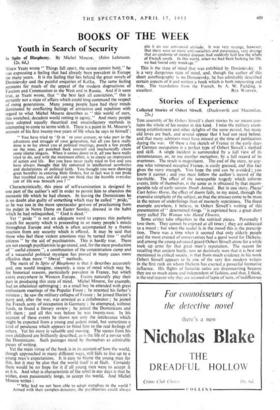BOOKS OF THE WEEK
Youth in Search of Security WHEN Yeats wrote " Things fall apart, the centre cannot hold," he was expressing a feeling that had already been prevalent in Europe for many years. It is the feeling that lies behind the great novels of Dostoievsky and the painful enquiries of Kafka. The same feeling accounts for much of the appeal of the modern dogmatisms of Fascism and Communism in the West and in Russia. And if it were true, as Yeats wrote, that " the best lack all conviction," this is certainly not a state of affairs which could long command the respect of rising generations. Many young people hye had their minds dominated by conflicting feelings of attraction and repulsion with regard to what Michel Mourre describes as " this world of ours, this wretched, decadent world rotting in agony." And many people have adopted equally theatrical and unsatisfactory methods in attempting to come to terms with it. There is a point in M. Mourre's account of his first twenty-two years of life when he says to himself : " You have tried to • fit in ' to your century, to take part in the
adventure and struggle of your generation, but all you have really done is to lay about you at political meetings, punch a few people on the nose, get punched back yourself and mechanically chant some idiotic slogans. When it comes down to it, all you have really tried to do, and with the minimum effort, is to create an impression of action and life. But you have never really tried to live and you have always thought that life consisted in intellectual acrobatics and declarations of political faith. You thought you were showing great humility in entering Holy Orders, but in fact was it not pride that troubled you, and did you not think that the humble everyday pat of life was beneath you ? "
Characteristically, this piece of self-examination is designed by one part of the author's self in order to permit him to abandon the monastic life which he had chosen. In leaving the Dominicans he is no doubt also guilty of something which may be called " pride," as he was too in the more spectacular gesture of proclaiming from the pulpit in Notre Dame on Easter Sunday, dressed in the habit which he had relinquished, " God is dead." Yet " pride " is not an adequate word to express this pathetic search for security which is proceeding in so many people's minds throughout Europe and which is often accompanied by a frantic reaction from any security which is offered. It may be said that those who feel these violent emotions may be turned into " useful citizens " by the aid of psychiatrists. This is hardly true. There are not enough psychiatrists to go round, and, for the mere production of " useful citizens ", a combination of the concentration camp and of a successful political mystique has proved in many cases mare effective than more " liberal " methods. The merit of In Spite of Blasphemy is that it describes accurately and, one would imagine, sincerely, a state of mind which may be, for historical reasons, particularly prevalent in France, but which exists everywhere- in Western Europe. Events naturally play their part in producing this state of mind. Michel Mourre, for example, had an atheistical upbringing ; as a small boy he attended with great enthusiasm meetings of the Popular Front ; he resented his father's mistress ; he saw the military collapse of France ' • he joined Dodoes party and, after the war, was arrested as a collaborator ; he joined the French army of occupation in Germany ; he attempted, without funds, to found a literary review • he joined the Dominicans and left them ; and all this was beforehe was twenty-two. In his account of these events he shows not only the intolerance which might be expected from a young and ardent mind, but sometimes a kind of petulance which appears to blind him to the real feelings of others. Yet his story is valuable and moving. The scenes from his own childhood are brilliantly described, as is the life of a novice with the Dominicans. Such passages stand by themselves as admirable pieces of writing. Yet the main virtue of the book is in its account-of how the world, though approached in many different ways, still fails to live up to a young man's expectations. It is easy to blame the young man for be this, but it may also that the world itself is at fault. Certainly there would be no hope for it if all young men were to accept it as it is. And what is characteristic of the rebel in our days is that he wishes, even passionately longs, to accept the world. And Michel Mourre writes : " Why had we not been able to adapt ourselves to the world ? Armed with their complex-detectors, the psychiatrists could always
pin it on our anti-social attitude, It was very strange, however, that there were so many anti-socialites and paranoiacs. very strange that an epidemic of mental diseases bad suddenly laid low the whole of French youth. In this world, when we had been looking for life, we had found only wreckage."
This is the state of mind that was exhibited by Dostoievsky. It is a very dangerous state of mind, and, though the author of this short autobiography is no Dostoievslcy, he has admirably described certain aspects of it and written a book which is both interesting and true. The translation from the French, by A. W. Fielding, is


































 Previous page
Previous page